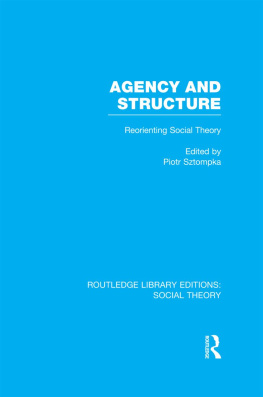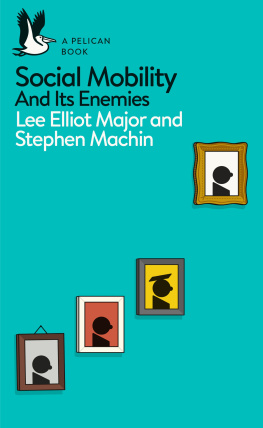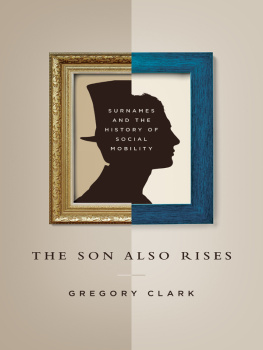First published 1971 by Transaction Publishers
Published 2017 by Routledge
2 Park Square, Milton Park, Abingdon, Oxon 0X14 4RN
711 Third Avenue, New York, NY 10017, USA
Routledge is an imprint of the Taylor & Francis Group, an informa business
Copyright 1971 by Anselm L. Strauss.
All rights reserved. No part of this book may be reprinted or reproduced or utilised in any form or by any electronic, mechanical, or other means, now known or hereafter invented, including photocopying and recording, or in any information storage or retrieval system, without permission in writing from the publishers.
Notice:
Product or corporate names may be trademarks or registered trademarks, and are used only for identification and explanation without intent to infringe.
Library of Congress Catalog Number: 2005043542
Library of Congress Cataloging-in-Publication Data
Strauss, Anselm L.
The contexts of social mobility : ideology and theory / Anselm L. Strauss : with a new introduction by Joseph Gusfield.
p. cm.
Includes bibliographical references.
ISBN 0-202-30773-5 (alk. paper)
1. Social mobilityUnited States. I. Gusfleld, Joseph R., 1923- II. Title.
HN90.S65S8 2006
305.5130973dc22
2005043542
ISBN 13: 978-0-202-30773-2 (pbk)
Introduction to the
AldineTransaction Edition
Anselm Strauss received his Ph. D in sociology from the University of Chicago in 1945. He died in 1996 after a long career in research, writing and teaching at the University of California, San Francisco where he also established a brilliant and productive department. In his career of fifty -one years he had a major impact on studies of medical organizations, qualitative methods, social psychology and, especially, the development of methods of social research. In these respects his work had and still has immense value. Republication of The Contexts of Social Mobility brings to new readers an exposure to a mode of thought that is original, significant and surprisingly contemporary.
Although The Contexts of Social Mobility was co-written with Barney Glaser there is little doubt that Strauss was the senior author and guiding spirit of the work, as the preface and introduction indicate. The two of them also collaborated on several other books. Three of these published between 1965 and 1971, clearly need to be seen as related to each other and to The Contexts of Social Mobility. These four studies should to be considered as a quartet. They exemplify and influence each other in a way that constitutes a consistent and impressive body of methodological and substantive work.
Awareness of Dying (1965) is an observational study of six San Francisco Bay-area hospitals. It examines the procedures and social relationships between patients, doctors, nurses and patients friends and relatives as these affect the patient and the processes involved in terminal illnesses. The character of the process is deeply influenced by the presence or absence of mutual awareness of the terminal form of the illness. These possible combinations provide the thrust of the work stated in the form of awareness contexts. Status Passage (1971) examines a variety of passages from one status to another such as marriage, divorce, resignation, retirement and many others. These are discussed in more general, formal terms such as the modes of duration or reversibility of the status. The Discovery of Grounded Theory (1967) is a programmatic statement which criticizes then dominant theory and offers a new methodological approach to sociological generalizations. It is the seminal work of Glaser and Strauss and informs the other three. It bears the subtitle Strategies for Qualitative Research.
They were critical of the then canon of good research in which hypotheses were deduced from theory and the end sought was verified generalizations. Glaser and Strauss espoused a more inductive approach in which theory was generated from past research or close acquaintance with observed data and continuously revised as new observations occurred. It would be grounded in the sense that the questions and generalizations emerged from the observations and field work. In The Contexts of Social Mobility they use the imagery of journalistic accounts, literary productions, academic research and other materials to generate ideas and insights in the form of a wide variety of contexts of mobility. The sociologist would not examine bureaucracies to verify or contradict Webers theories but examine materials which are pertinent to studying bureaucracies to develop theories of how they function in different contexts.
In the eclectic and broad uses of past data Glaser and Strauss were able to broaden the study of social mobility well beyond that of verifying or contradicting the American dream of rags to riches. Their focus is on the many processes and characteristics of mobility rather than on the single theme of the mobility of individuals. Consider their focus, in one section of The Contexts of Social Mobility, on collective aspects of mobility and on understanding the experiences and contexts of duration and mobility which affect groups and impinge on the individuals. Aspects of extended family, of class, of ethnicity were part of sociological studies but were often subsidiary to the individual as subject of mobility in many mobility studies. The historical or institutional elements were often ignored. Thus historical settings, social movements, and a wide variety of contexts are explored by Glaser and Strauss.
Duration, for example, constitutes an important context. The attractive woman whose mobility has depended on her looks must face the consequences of age as does the athlete. The career of the professor or the businessman is different and presents different problems of aging and mobility.
Here we need to describe the important distinction, in The Discovery of Grounded Theory, between substantive and formal theory. Substantive theory was generated from studying a specific field or area of research, such as the study of prisons. What is found in the study of one more prison is expanded to encompass other substantive areas. We move toward a more generalizable idea based on more than one area. Goffmans development of the idea of total institutions would provide a concept encompassing asylums, prisons, armies, and even possibly colleges. All of these provide a total environment for their members. The ways in which they are similar and are different are sources for unlocking our imagination and understanding of how they may be secured or changed.
This leads us to understand the importance of comparative data in discovering theory. Much of the value of sociology lies in the ways in which data is perceived as similar or different from other data. As Goffman put it, Whats play for the golfer is work for the caddy. Similarly, one can perceive prostitution as a form of deviance and thus find similarities to other studies of deviant behavior. Alternatively, but not exclusively, prostitution can be seen as a form of work. We look for how it is similar or different from waiting on tables, teaching, medical practice or playing music. In still another way of seeing the data, we can take a common experience and examine it across areas. For example, mistakes could be studied in teaching, in playing music, in waiting on tables, in medical practice and in prostitution. This can shed light on what is common to work and what is common in similar contexts.







